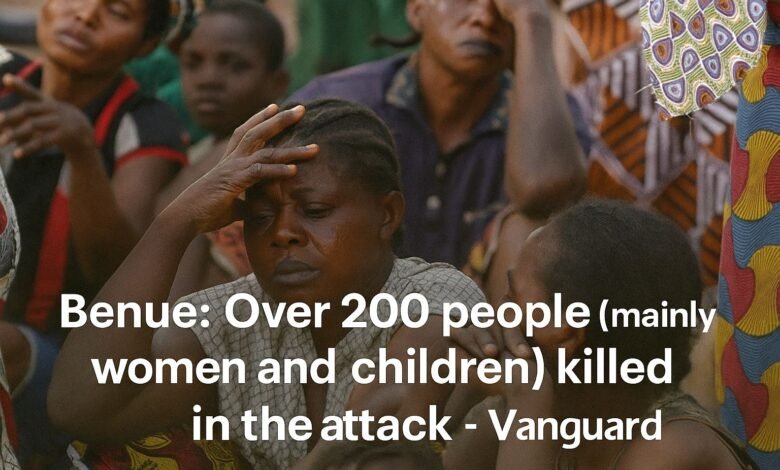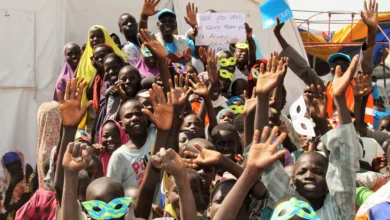When a Child is Killed, the Law is Broken: The Benue Massacre and the Legal Crisis We Must Confront

Yesterday, I wrote a reflection on the Benue killings. Today, my heart turns to an even more haunting truth, the fact that children were among those massacred.
Multiple reputable news platforms have reported the horror. Here are just a few highlights:
- Vanguard: Over 200 people, mostly women and children were killed in the attack.
- Reuters: 100 people killed in Yelwata, Benue, including four children from a single family.
- AP News: Shared the heartbreaking account of Titus Tsegba, who lost his wife and four children in one night.
As a father, I cannot help but feel the searing pain of the parents whose precious children were so brutally and senselessly taken. Their lives, young, innocent, and full of promise, were wasted in a massacre that should shake the conscience of any nation still capable of feeling.
Some may argue that in Nigeria, the law does not matter, that justice is too weak or too slow to respond. I understand that cynicism. It is not lost on me. But I also believe this: with each conversation like this, we make a deposit in the conscience of the nation. We plant the seeds of public will, and public will, over time, can birth political will. That is how systems shift.
It is in that spirit that I write as a father, as an advocate, as a family attorney, and above all, as a human being.
Children Killed in Benue: What the Law Says
Understanding Nigeria’s Child’s Rights Act 2003 in the Context of Armed Violence
This is not just a humanitarian tragedy. It is a legal crisis.
1. Right to Life (Section 4, CRA)
Provision: “Every child has the right to survival and development.” (Section 4, CRA 2003)
Section 3 also affirms that the fundamental rights in the Nigerian Constitution, including the right to life under Section 33, shall apply to every child.
Legal Insight: The killing of children in armed attacks like those in Benue violates the most fundamental right, the right to life. The Nigerian government is legally obligated to protect this right and ensure every child can survive and thrive.
2. Protection from Violence (Section 11, CRA)
Provision: “Every child is entitled to respect for the dignity of his person… no child shall be subjected to physical, mental or emotional injury, abuse, neglect or maltreatment, including torture, inhuman or degrading treatment or punishment.”
Implication: Whether by death, injury, or trauma, exposing children to armed violence is a breach of dignity. No child should ever bear the burden of adult warfare.
3. Responsibility of the State (Sections 16 & 171–174, CRA)
Provision:
- Section 16: “Every child in need of special protection measures has the right to such measures of protection… and the State shall ensure the provision of such protection.”
- Sections 171–174 (Part XV – State Government Support for Children and Families): These provisions mandate State Governments to:
- Provide services for children in need of care and protection
- Support voluntary organizations working with vulnerable children
- Establish day-care and child-minding services
- Offer accommodation for children in care, including those in emergency situations
Implication: The State’s responsibility is both individual and systemic. It is not optional or reactive, it is a legal duty.
The Nigerian government must:
- Recognize children orphaned, displaced, or traumatized by armed conflict as children in need of special protection
- Provide shelter, trauma care, education, and sustained reintegration
- Mobilize welfare institutions and social infrastructure to deliver family-based and institutional care
- Maintain a protective system, not just an emergency response
This is the framework of accountability against which the response to the Benue tragedy must be measured.
4. Children Affected by Armed Conflict (Section 16, CRA)
Provision: “Every child in need of special protection measures has the right to such measures of protection as are appropriate to his physical, emotional and moral conditions and to the circumstances of his case, and the State shall ensure the provision of such protection.”
Implication: Children displaced, orphaned, injured, or traumatized by the Benue killings are legally recognized as children in need of special protection.
The State must provide:
- Temporary shelter and safety
- Psychosocial and trauma support
- Access to education and family tracing
- Safe reintegration or resettlement
- Legal identity and continuity of care
This is not just welfare, it is law.
5. The Duty to Investigate and Prosecute
Legal Foundations:
- Section 33 of the Nigerian Constitution – Right to Life
- UN Convention on the Rights of the Child (CRC)
- African Charter on the Rights and Welfare of the Child
The State Must:
- Investigate killings
- Prosecute perpetrators
- Prevent recurrence
- Provide justice and redress
6. What Must Be Done
When children are killed in armed attacks like in Benue, it is not only a moral failure—it is a legal breach of national and international law.
✅ The Government Must:
- Prevent such tragedies
- Protect surviving children
- Hold perpetrators accountable
- Rebuild communities with children’s rights at the center
Final Message: A Call to Action
“The blood of children is not collateral damage. It is a cry for justice.”
LAWGUARD360® Because the law must protect the most vulnerable.





